#university of mary washington
Text


As the police escalate violence, beat and attack students and professors, and conduct mass arrests, student protesters should know their rights.
Here is the link to the National Lawyer's Guild booklet for protesters.
If you plan on going out to support the protests, please take some time to read through this and know your rights.
#columbia#gaza solidarity encampment#cuny#student intifada#free palestine#northeastern university#emory#nypd#university of connecticut#University of texas at austin#ucla#cal poly humboldt#usc#university of minnesota#arizona state university#yale#princeton#university of mary washington#indiana university bloomington#cwru#nyu#ohio state university#university of georgia#columbia university#police brutality#police violence#nlg#national lawyers guild#protest#protesting
623 notes
·
View notes
Text
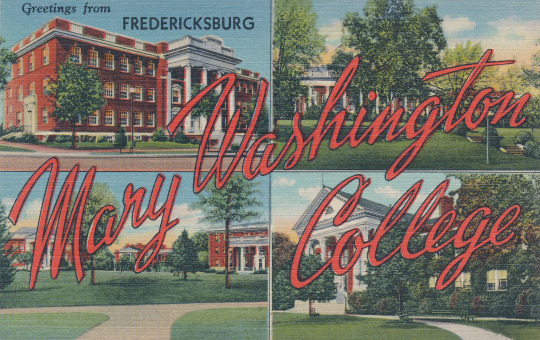
Recent Acquisition - Postcard Collection
Greetings from Fredericksburg.
Mary Washington College.
24 notes
·
View notes
Text
blogging live from this random parking lot i stopped it while driving because i got confused about the directions this stupid ass maps app was giving me. anyway logging on to say that poll about what people associate with each state and everyone on the virginia one said they associate virginia with shit drivers. yeah and the thing is that’s real. unfortunately i can’t even refute that claim due to my also being a shit driver but the thing is i am NOT even doing the things these other people are doing!!!!! also the road has not matched up very neatly with what freaking. apple maps has to say 🙄 “beth aren’t you going somewhere you’ve been before many times? aren’t you visiting family?” listen. i’ve only had to drive myself this way one other time…. and it sucked less then because i was with tami…. anyway. can i say something real and true. i don’t care that this is the historic childhood home of george washington. you’re not mount vernon pack it up ok some of us are trying to drive through this fucking city without losing our minds. or our lives frankly.
#and frankly. fuck the students of mary washington university while we’re here 🙄#that post about slowly doxxing yourself. well. i’m doxxing this parking lot for sure!
4 notes
·
View notes
Link
It was a historic moment Wednesday, as marble statue of Dr. Mary McLeod Bethune,the founder of Bethune-Cookman University and champion of civil and women’s rights was unveiled in Statuary Hall in our nation's Capitol.
Watch the entire ceremony.
2 notes
·
View notes
Note
I wanted to know how Aaron Hotchner would react to discovering the existence of a daughter (something from college perhaps), she would be his copy both in appearance and personality
—Hotch has a surprise visitor and the world spins on a new axis. daughter!reader, 2.2k
readers physical traits like hair and skin colour are not mentioned, but she is described as looking like her mother (also not described) and as sharing some characteristics with Hotch!<3 I also altered canon so that Hotch meets Haley after college
“There is a kid in your office.”
“Morgan?”
Hotch pulls his phone away to check. D. Morgan blinks on his phone screen. It’s a slightly absurd sentence.
“There’s a child in my office?” he asks, returning the phone to his ear.
“I’m standing with her right now. She won’t tell me who she is. Anderson let her in.”
“How old?” Hotch asks, scratching his cheek. God forbid he steal two minutes of peace in the bathroom.
“How old are you, sweetheart?”
“I’m twenty two,” a feminine voice says.
“You said kid,” Hotch says, frowning.
“Anyone under twenty five is a kid to me. Are you on your way?”
He sighs. “Yeah,” he says, and hangs up, dropping the small body of his phone into his pocket. Twenty two isn’t a kid, it’s a year younger than Spencer was when he started at the BAU; Hotch doesn’t underestimate the intelligence of young adults. Why you’re in his office is another thing. He can’t have one day without inconvenience.
Hotch makes his way into the BAU office and up the stairs to the half level where his own office resides. Morgan leans against the door with his arms crossed, standing to attention when Hotch passes.
“Thanks, Morgan,” Hotch says.
Morgan nods, sending a curious gaze at you before he leaves.
You’re dressed very formally for someone your age, but it’s not as though this is different from the norm of the building. You have on a dark shirt with a starched collar and a fitted blazer, a crisp skirt, and leather Mary Jane heels, one pressed flat to the back of the other.
You stand when he comes in.
“Mr. Hotchner?” you ask.
“Yes?” he asks.
You have a small file in your hand. Paper with worn edges pokes out of one side as though you’d been looking through it and put it hastily away, and the Manila file itself is fresh.
“Do we know one another?” he asks.
You look familiar. It’s possible he would’ve known your parents —it could make sense. A colleague or acquaintance assumed he could help you with something, and you in your naivety you made your way in.
“I think you know my mother.”
“And she was?” he prompts. Not impolite, but needing to move forward. He’s very busy.
You take a small step back. “Mr. Hotchner,” you say again, something nervous in your eyes as you lift your chin, “I don’t want to waste your time. I’m aware I might sound foolish, or that this… might not be something you want to hear, but. My mother told me you met in college, and that…”
You bite your lip.
He’s incredibly confused now. Not one to let a stranger suffer whether in real pain or awkwardness, he opens his hand. “Can I?”
“Yes, sir,” you say.
You don’t want to pass it over, but you do as he’s asked.
The photograph is a shock, held with a paperclip to a magnolia sheet of paper. It’s of Hotch, undoubtedly, a much younger Hotch sitting on a bench with a woman he recognises immediately. He only looks at her, and he knows why you’re here, and he knows exactly what you’re thinking.
“Do you remember her?” you ask quietly.
He doesn’t answer.
“She says you’re the only man that could… possibly be my father.” You hold your hands behind your back.
He lifts the photograph. There’s not much else to look at, only your photo ID, your birth certificate where he is glaringly not listed, as well as your mother’s birth certificate, and proof of her enrollment at George Washington University.
You look a little teary. Trying very hard to be sober, as you have been since he laid eyes on you, but clearly getting more and more upset as time goes on. He’s feeling a similar ache, a searing pain in his chest, staring at you from over the Manila folder to really, really look at you. He swears he can see something of himself in your face, though he’s not sure what. Perhaps it’s wishful thinking.
There’s certainly some of him in your frown.
“I think you should sit down,” he says softly.
You sit down immediately in the chair you’d inhabited a few minutes ago.
He’s not sure what to say. Are you sure it could only be him? Is your mother? But you’re looking at him with an expression he practically trademarked, whether he wanted to or not, and the proof is in his hands: you’re your mother’s daughter, and Hotch would have slept with her almost twenty three years ago. He doesn’t need much time to do the math.
“I realise my word alone isn’t a lot to go on, sir, so– so if you’d want to, I’ll of course submit for a paternity test. Or if you want nothing to do with me, that’s okay too.”
“It’s not okay,” he says, closing your folder.
Your eyes widen just a touch.
“Can I sit with you?” he asks.
You push your chair back to make lots of room. He sits in the chair besides yours, cautious that being across a desk from you is insensitive, or cold, at least.
He looks at you and he’s sure that you’re his. The longer you sit there, the more sure he becomes.
“I do want a paternity test,” he says, watching your tight nod.
He believes you. And truly, if he was unsure of what you’re saying he’d still give you grace now, because the first time you meet your father should be full of love. He should’ve been there to hold you in one arm twenty two years ago, he should’ve been there for you through everything he’s already missed.
“But I believe you,” he says.
“You do?”
“I’m a very good judge of character. I know that you believe what you’re telling me completely,” he says.
“How?”
“When you’re nervous your hand drifts to your chest, but you didn’t move when you suggested I’m your father. You haven’t once checked the door or looked toward the camera in the corner of the room.” And the full truth. “I want to believe you.”
“Why?” you ask.
“You look like your mother, but…” He lets himself smile. “You sound like me.”
You laugh under your breath. “Hopefully not so deep.”
“I’ve had it described to me as mellifluous.”
“I’ve wanted to hear your voice since I can remember. My mom didn’t talk about you much, but I’ve always wondered. She told me she didn’t know who you were, and…”
“And you believed her. Any child would do the same.”
“She’s made mistakes.” You look to him with eyebrows gently pinched, asking him to understand. “But I looked you up. When she told me your name, I looked for you online, and… I always thought I never needed you, even if I wanted to know you. I thought you might want to know me. I thought that a man like you would want to know.”
There’s something you’re not saying. Hotch doesn’t mind. “Of course I want to know you.”
You chance a smile at him. “You really believe me?”
“You were expecting me to turn you away.”
“No, just– I’m not a kid, even if your colleague said so. And I’m not an image of you, I don’t have your eyes. All I have is that photograph. There's not much evidence to go on.”
He sees no reason why a young girl like you would walk into his office and tell him who you are. Self preservation insists on a paternity test, and soon —UnSubs haven’t ever done something so conniving as imitating a family member yet, but there’s no prediction for evil— but Hotch has an inherent sense of the truth.
“What do you do?” he asks.
You frown. “Sorry?”
“What do you do?” he asks again, “You’re dressed like a lawyer.”
You nod with a smile you’re pushing into a flat line unsuccessfully. “I’m at GWU. For law, like you and my mom.”
“She only just told you who I am?” He speaks each word carefully.
“The photo fell out of an old album, and I had a funny feeling. I asked her about it and she said I’m too much like you. She admitted it like the secret had been eating her alive.” You look at your hand on the armrest. “We aren’t getting along right now.”
“I don’t know why she wouldn’t tell you. Or me,” he says honestly.
“I don’t know either.”
Hotch is expecting a lot more awkwardness than he feels as he puts his hand over yours. You stay very still.
“Thank you for coming here today.” He gives your hand the barest squeeze and stands. “Have you eaten? I could take you out for dinner,” he suggests.
You stand with him. “Are you serious?” you ask, gentle and pleased at once.
“I think you have a lot to tell me, and I’d love to listen.”
“You’re not working?”
Sometimes, sometimes, there are things that can be worked around or held on the back burner. You and Hotch go for lunch.
—
Aaron Hotchner knows many important people. Your paternity test takes a day, less than twenty four hours from the time you both submit samples, but you have a class you can’t miss and he’s sure you’re nervous, so you don’t meet again for two days regardless. By then, you both know the results. (And Aaron’s had to have a very strange conversation with his wife, in which she doesn’t believe him, and then has to sit down.)
He can admit to being far more protective of you once he knows the truth for sure, though he knows it before the results come back. You’re his daughter, and he’s left you without a father for two decades of your life, your formative years, time he can never get back.
He doesn’t even know what to do. How can he make up for it? Twenty two years of birthday cards? He feels like buying you a diamond necklace with a stone for each year, and then he wants to buy you a house, but mostly he wants to give you a hug. He thinks about it for so long the morning before he’s scheduled to meet you again that it makes him as upset as he’s ever been in his life, desperate to say sorry to you and your mother and furious with her for keeping you a secret.
He thinks of all those years without an inkling of your existence, and now you’re the only thing he can think about. His remorse makes him sick.
You’re smiling when you see him. For a millisecond, you look like Jack.
“Hi, Mr. Hotchner!” you say, standing from the table, your formal dress and cardigan pressed neatly, your hands held behind your back.
‘Mr. Hotchner’ will need to be fixed quickly, though he won’t force you to call him anything else. He can’t help himself, however.
“Hi, sweetheart,” he says softly.
You pause, and you laugh. “This is weird.”
He doesn’t mean to make it weirder, but he opens his arms, and he waits for an indication that you might not want a hug before he leans in to hold you. You’re still so young. There’s still time for him to be a good father to you.
He can’t say everything he needs to in his hug, and at the end of the day he’s a stranger to you; you probably don’t want him to hug you for too long. But he rubs your back, and he promises himself that he won’t let you down twice.
Your arm curls tentatively behind his back. For a second, you press your face to his shoulder and breathe.
“Are you okay?” he asks, pulling away.
Your lip twitches to one side like his would when presented with such heavy sincerity. “I’m okay. How did, um, Haley take the news?”
“She just wants to meet you, okay? You’re part of my family now.”
You give no indication you’ve heard what it is he’s saying to you, or whether you like it as you sit down at the dinner table. He quite likes that some way, somehow, you’ve become like him, but he wonders if he might not love it so much when he asks how your mom is taking this new development and you just smile.
“We’re going to tell Jack about everything this weekend,” he adds. “He’ll be excited, if no one else.”
“And Haley doesn’t mind?”
“She’s not going to ask you to babysit anytime soon, honey, but no, of course she doesn’t. He should meet his sister before she’s too old for legos.”
You actually laugh.
Dad humour transcends age, and for that, Hotch is grateful.
—
only after I finished did I wonder if I misinterpreted the request and this was supposed to be x reader with a shared daughter so if that’s the case I’m sorry original requester!! and I can totally write that if that’s what you meant 🫶❤️
#aaron hotchner x reader#aaron hotchner#aaron hotchner fic#aaron hotchner blurb#aaron hotchner drabble#aaron hotchner imagine#aaron hotchner fanfic#aaron hotchner fanfiction#hotch x reader#hotch#hotch x you#hotch blurb#hotch drabble#criminal minds#aaron hotchner and daughter!reader#aaron hotchner fluff
2K notes
·
View notes
Text
"Israel also secretly hires Jewish Americans as spies to work out of its Washington embassy and its consulates around the United States to covertly surveil and monitor fellow Americans, including students. Thoroughly vetted to ensure loyalty to Israel, many of those hired have spent years heavily involved in pro-Israeli activities from the time they were in college and before. Among them was Julia Reifkind, who led a pro-Israel group at the University of California at Davis before moving on to become an activist with AIPAC. After she graduated in 2016, she was hired by Israel and assigned to its embassy in Washington.
Reifkind had good preparation for her assignment. Thinking that Kleinfeld was a fellow pro-Israel activist, over dinner at Washington’s Mari Vanna restaurant she revealed that while at AIPAC she spent much of her time deceiving college students about her covert connection to the organization. “Obviously, I’m an AIPAC-trained campus activist,” she said. “When you’re lobbying on behalf of AIPAC, you don’t say AIPAC, you say, ‘I’m a pro-Israel student from UC Davis.’ And when you’re meeting with students on campus I would never say, ‘I am the AIPAC campus rep.’ I’d say, ‘My name is Julia and I’m a pro-Israel student.’”
At the embassy, Reifkind focused on developing intelligence on fellow Americans, including students on college campuses. “So nobody really knows what we’re doing,” she said. “But mainly it’s been a lot of research like monitoring BDS.”
In a different conversation, Reifkind explained: “It’s mainly gathering intel, reporting back to Israel. That’s a lot of what I do. To report back to the Ministry of Foreign Affairs, the Ministry of Strategic Affairs, and make sure they have the right information.” Among the ways she spies on pro-Palestinian activists and Palestinian human rights supporters is with phony Facebook accounts. “I have my fake Facebook that I follow all the SJP [Students for Justice in Palestine] accounts. I have some fake names. My name is Jay Bernard or something.”
Once Reifkind collected the intelligence on her targets, she passed it on to her boss at the embassy. Then it was sent to the Ministry of Strategic Affairs and other offices over a secure encrypted system called Cables. It’s “really secure,” she said. “I don’t have access to [it] because I’m an American.… I’ve seen it, it looks really bizarre…. And then they’ll send something back and he’ll translate it and tell me what I need to do.”
Since the brutal Hamas attacks on Israeli civilians on October 7 and the Israeli invasion of Gaza, the ICC and its US-based spy networks are no doubt working overtime. But there is little likelihood of interference by the FBI—well trained to look the other way when it comes to Israel. It was a situation that even frustrated a former head of the FBI’s counterintelligence division. When I asked him why no one would talk to me about Israel’s massive espionage in the United States, he simply shook his head.
“You don’t think Israel’s a sensitive topic?” he asked, requesting that his name not be used. “So, Israel has been looked at and is being looked at and that’s all I can tell you,” he said. “But nobody’s doing anything.”
“Why not?” I asked.
“You can imagine,” is all he would say, implying high-level political involvement. I then said that I was planning to write about the topic. “I hope you do. I hope you do,” he said. Sighing, he added, “I’ve been there done that. I know it. I’ve brought cases to the Department of Justice on Israel.” Cases that were never opened."
— Israel’s War on American Student Activists by James Bamford on The Nation
857 notes
·
View notes
Text
Billboard Chart Topping Gospel Singer Keyondra Lockett Pays Homage to Music Icon Jody Watley at 2022 Women Songwriters Hall of Fame Induction

Music royalty gospel singer Keyondra Lockett is confirmed to perform a special musical tribute honoring iconic superstar/singer/songwriter Jody Watley, a Grammy winning pioneer in music, video, fashion and style at the Women Songwriters Hall of Fame (WSHOF) Induction Gala on August 27th in Washington, D.C.
Watley will be inducted in the 2022 Women Songwriters Hall of Fame class at the ceremony.
"I am excited to perform a special tribute to the one and only Ms. Jody Watley. She is beautiful, classy, and a legend known all around the world," says Lockett. "This will be one of those incredible and memorable moments for me to cherish a lifetime."
The Women Songwriters Hall of Fame honors women whose body of work represents the best of the heritage and legacy of modern American music and pay homage to noteworthy female songwriters.
This year's 2022 inductee class include: Jody Watley, Loretta Lynn, Gloria Estefan, Siedah Garrett, Indigo Girls, Doe, Junko Yagami, Rose Marie McCoy and Marilyn Bergman (Posthumously).
"I'm thrilled to be included as an honoree with my other esteemed songwriter peers at the event," says Watley. "I would also like to thank Janice McLean DeLoatch and the WSHOF committee members for selecting me to be inducted into the Women Songwriters Hall of Fame. It is truly an honor."
The stellar event will take place at George Washington University, 2121 I Street NW, Washington, DC and celebrate some of music’s finest songwriters and composers in a magnificent moment to mark their careers and their classics.
For more information and to purchase tickets to the event, visit
womensongwritershalloffame.org
Follow Jody Watley on all social media platforms @jodywatley.
Follow Keyondra on all social media platforms @KeyondraLockett.
#Music#Gospel Music#Keyondra Lockett#Jody Watley#Women Songwriters Hall of Fame#2022 Women Songwriters Hall of Fame#George Washington University#Janice McLean DeLoatch#WSHOF#Loretta Lynn#Gloria Estefan#Siedah Garrett#Indigo Girls#Doe#Junko Yagami#Rose Marie McCoy#Marilyn Bergman#naom richard#naomi j richard#naomijrichard#rcv#Red Carpet View#KAZI 88.7#KAZI 88.7FM#The Voice of Austin#billboard
0 notes
Text
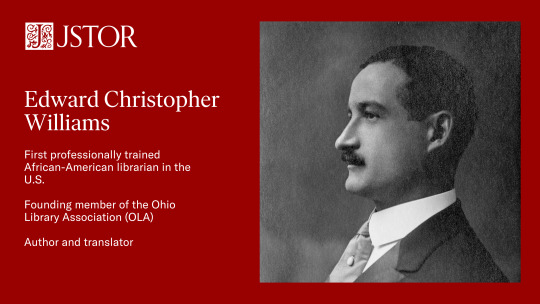
Edward Christopher Williams (11 Feb. 1871 - 24 Dec. 1929) was a pioneering African American librarian, educator, and scholar who played a vital role in shaping library collections at Western Reserve University (WRU) and Howard University. Born in Cleveland to Daniel P. Williams, a prominent African American figure, and Mary Kilkary Williams, a Clevelander of Irish descent, Williams embarked on a remarkable journey of academic and professional achievement.
Graduating from Adelbert College of WRU in 1892, Williams quickly made his mark as he assumed the role of first assistant librarian at the institution. His dedication and expertise saw him ascend to the position of head librarian in 1894 and university librarian in 1898. Eager to deepen his knowledge, Williams pursued further studies in library science at the New York Library School in Albany, completing the rigorous 2-year program in just one year.
Williams's impact on WRU's library was profound; he significantly expanded its collection and elevated its standards, establishing himself as an authority in library organization and bibliography. His advocacy for the establishment of a school of library science at WRU led to its inception in 1904, where he became an esteemed instructor, offering courses in reference work, bibliography, public documents, and book selection.
A founding member of the Ohio Library Association, Williams played a pivotal role in shaping its constitution and direction. However, in 1909, he left Cleveland to assume the role of principal at M St. High School in Washington, D.C. His tenure there was marked by his unwavering commitment to education and leadership.
In 1916, Williams joined Howard University as university librarian, further cementing his legacy in the realm of academia. Not only did he oversee the university's library, but he also directed Howard's library training class, taught German, and later chaired the Department of Romance Languages.
In pursuit of academic excellence, Williams embarked on a sabbatical in 1929 to pursue a Ph.D. at Columbia University. Tragically, his studies were cut short by his untimely passing later that year.
In 1902, Williams married Ethel P. Chesnutt, the daughter of Charles Chesnutt, a renowned author. Their union bore one son, Charles, who would carry on his father's legacy in the years to come.
Read more about Edward Christopher Williams here.
158 notes
·
View notes
Text
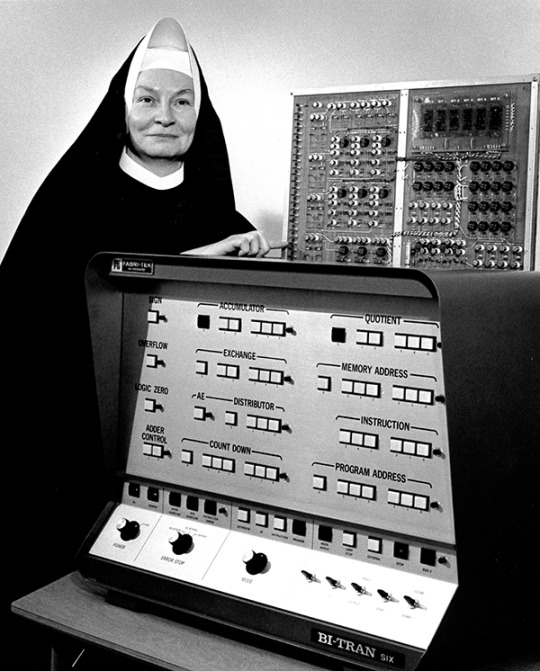
"Mary Kenneth Keller of the Sisters of Charity of the Blessed Virgin Mary was a pioneer in computer science. In 1965, she, along with Irving Tang at Washington University, was the first in the United States to earn a doctorate in that field; and yes, she was not only a woman, but also a nun."
404 notes
·
View notes
Text
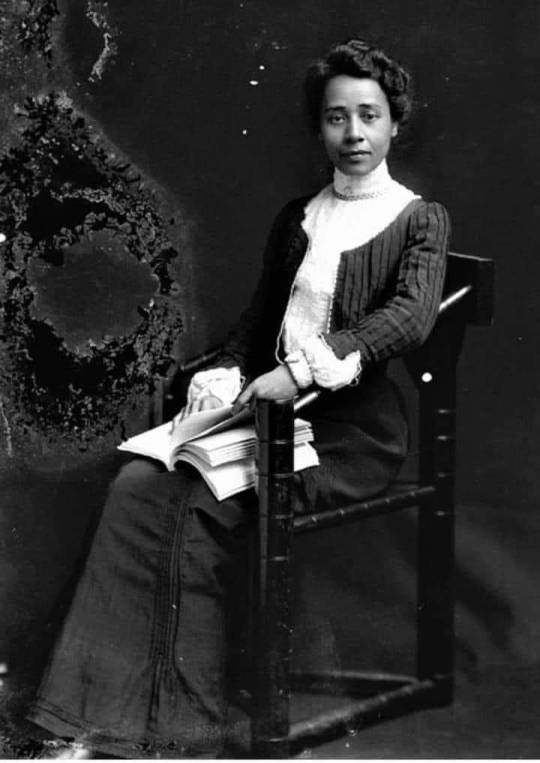
𝗔𝗡𝗡𝗔 𝗝𝗨𝗟𝗜𝗔 𝗛𝗔𝗬𝗪𝗢𝗢𝗗 𝗖𝗢𝗢𝗣𝗘𝗥 (1858-1964)
Anna Julia Haywood Cooper was a writer, teacher, and activist who championed education for African Americans and women. Born into bôndage in 1858 in Raleigh, North Carolina, she was the daughter of an enslaved woman, Hannah Stanley, and her owner, George Washington Haywood.
In 1867, two years after the end of the Civil Wàr, Anna began her formal education at Saint Augustine’s Normal School and Collegiate Institute, a coeducational facility built for former slàves. There she received the equivalent of a high school education.
Anna Haywood married George A.G. Cooper, a teacher of theology at Saint Augustine’s, in 1877. When her husband died in 1879, Cooper decided to pursue a college degree. She attended Oberlin College in Ohio on a tuition scholarship, earning a BA in 1884 and a Masters in Mathematics in 1887. After graduation Cooper worked at Wilberforce University and Saint Augustine’s before moving to Washington, D.C. to teach at Washington Colored High School. She met another teacher, Mary Church (Terrell), who, along with Cooper, boarded at the home of Alexander Crummell, a prominent clergyman, intellectual, and proponent of African American emigration to Liberia.
Cooper published her first book, A Voice from the South by a Black Woman of the South, in 1892. In addition to calling for equal education for women, A Voice from the South advanced Cooper’s assertion that educated African American women were necessary for uplifting the entire black race. The book of essays gained national attention, and Cooper began lecturing across the country on topics such as education, civil rights, and the status of black women. In 1902, Cooper began a controversial stint as principal of M Street High School (formerly Washington Colored High). The white Washington, D.C. school board disagreed with her educational approach for black students, which focused on college preparation, and she resigned in 1906.
In addition to working to advance African American educational opportunities, Cooper also established and co-founded several organizations to promote black civil rights causes. She helped found the Colored Women’s League in 1892, and she joined the executive committee of the first Pan-African Conference in 1900. Since the Young Women’s Christian Association (YWCA) and the Young Men’s Christian Association (YMCA) did not accept African American members, she created “colored” branches to provide support for young black migrants moving from the South into Washington, D.C.
Cooper resumed graduate study in 1911 at Columbia University in New York City, New York. After the death of her brother in 1915, however, she postponed pursuing her doctorate in order to raise his five grandchildren. She returned to school in 1924 when she enrolled at the University of Paris in France. In 1925, at the age of 67, Cooper became the fourth African American woman to obtain a Doctorate of Philosophy.
In 1930, Cooper retired from teaching to assume the presidency of Frelinghuysen University, a school for black adults. She served as the school’s registrar after it was reorganized into the Frelinghuysen Group of Schools for Colored People. Cooper remained in that position until the school closed in the 1950s.
Anna Julia Cooper dièd in 1964 in Washington, D.C. at the age of 105.
#anna cooper#black tumblr#black history#black literature#black community#black excellence#civil rights#black history is american history#black girl magic#blackexcellence365
104 notes
·
View notes
Text
by Mary Chastain
Columbia University is in shambles.
How much longer until other universities fall? Let’s check in on them.
Right now I have UCLA, Northwestern, Portland State, NYU, University of Washington, Penn State, UNC, and CUNY.
UCLA
A parent released audio of a phone call with the UCLA Police Department.
@UCLA gave permission to release this audio of her phone call with @UCLAPD as they describe the school's directive to allow protestors to restrict the movement of Jewish students. "Are the protestors allowed to block students who are paying tuition from classes? No, but unfortunately, they have taken over that area." "We've received a directive not to intervene" "So you're allowing the protestors to block the Jewish students?" "I'm not allowing it... the school is. Yes, the school is saying that they will not be removed at this time."
The school doesn’t care that these people block Jewish students from classes.
We have videos of these people blocking Jews from campus and the library. We have videos of these people assaulting Jews.
Lots of videos of campus anti-Jewish insanity here at Legal Insurrection.
#ucla#columbia university#northwestern university#portland state#nyu#university of washington#penn state#unc#cuny
53 notes
·
View notes
Text
The Fix - Chapter 1
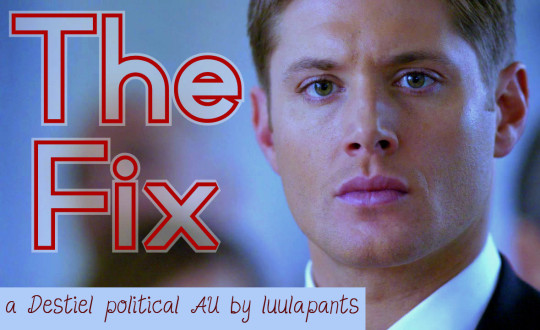
Destiel | Rated E | WIP
Castiel’s eyes scanned the file once, quickly, then again more slowly, taking in every detail, starting to sort them into mental boxes: basic, irrelevant, potentially consequential, definitely consequential, exploitable.
Basic: Kansas Representative Dean Winchester, age 32. Republican. Brown hair, green eyes. Born in Lawrence, Kansas. Resident of Gypsum, Kansas, a suburb of Salina, with an apartment in Washington, DC. Appointed to his seat after the untimely death of his father, former representative John Winchester.
Irrelevant: Graduated from Brown University with a Bachelor’s in political science. Competitive skeet shooter. Classic car aficionado. Chose classic rock songs for all of his campaign rallies.
Potentially consequential: Married to a Lisa Winchester-Braeden, age 34, with a son, Ben, who was born healthy seven months after their wedding. She owned a wellness brand that operated more-or-less as a pyramid scheme. Mother, Mary Winchester, was murdered in a home invasion in 1981, which inspired her husband’s tough-on-crime political campaign.
Definitely consequential: Younger brother, Sam Winchester<, a liberal activist lawyer working with groups such as Greenpeace, The Green Party (a picture of him shaking hands with Ralph Nader), the ACLU, and The Innocence Project. Currently involved in a massive class action lawsuit against the Kansas Department of Corrections. Dean’s previous jobs were in the orbit of their father – his campaigns, his staff, more recently on the board of The Mary Winchester Foundation.
Exploitable: A single Polaroid photograph, stored in a black plastic sleeve, of Representative Winchester, naked face-down on a bed, hands bound and a blindfold tied at the back of his head, the penis of whoever took the photograph buried in his asshole.
Cas traced his thumb along the edge of the photograph, then carefully tucked it back into the sleeve. “So what’s the plan for him?” he asked.
Zachariah held his hands wide as if this were not his devising but rather an inevitability that had fallen into his lap, leaving him helpless but to receive it. “He’s young. Conservative. Politically viable.”
“And easy to control,” Cas supposed. He could see it, the whole trajectory they had planned for Mr. Dean Winchester. Today a representative. In a few years, he could be appointed to the senate when Brownback went for the governorship. He wondered if they would dare to lift a puppet like this any higher than that. A sex scandal waiting to happen. Or maybe that was where Cas came in.
Read the rest on AO3
#destiel#dean winchester#castiel#supernatural fanfiction#the fix#supernatural politics au#I decided that alternating WIP updates might make me work better let's find out
81 notes
·
View notes
Text
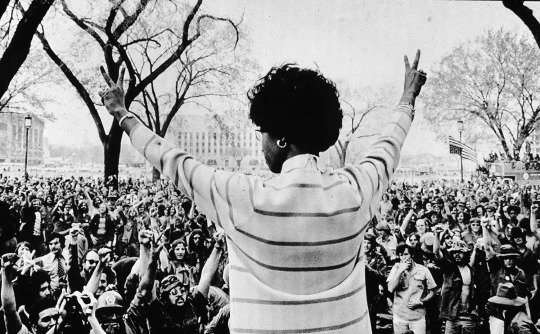
Black women have made important contributions to the United States throughout its history. However, they are not always recognized for their efforts, with some remaining anonymous and others becoming famous for their achievements. In the face of gender and racial bias, Black women have broken barriers, challenged the status quo, and fought for equal rights for all. The accomplishments of Black female historical figures in politics, science, the arts, and more continue to impact society.
Marian Anderson (Feb. 27, 1897–April 8, 1993)

Underwood Archives / Getty Images
Contralto Marian Anderson is considered one of the most important singers of the 20th century. Known for her impressive three-octave vocal range, she performed widely in the U.S. and Europe, beginning in the 1920s. She was invited to perform at the White House for President Franklin Roosevelt and First Lady Eleanor Roosevelt in 1936, the first African American so honored. Three years later, after the Daughters of the American Revolution refused to allow Anderson to sing at a Washington, D.C. gathering, the Roosevelts invited her to perform on the steps of the Lincon Memorial.
Anderson continued to sing professionally until the 1960s when she became involved in politics and civil rights issues. Among her many honors, Anderson received the Presidential Medal of Freedom in 1963 and a Grammy Lifetime Achievement Award in 1991.
Mary McLeod Bethune (July 10, 1875–May 18, 1955)
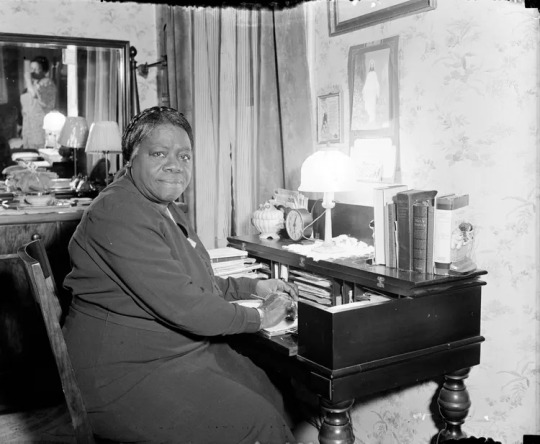
PhotoQuest / Getty Images
Mary McLeod Bethune was an African American educator and civil rights leader best known for her work co-founding the Bethune-Cookman University in Florida. Born into a sharecropping family in South Carolina, the young Bethune had a zest for learning from her earliest days. After stints teaching in Georgia, she and her husband moved to Florida and eventually settled in Jacksonville. There, she founded the Daytona Normal and Industrial Institute in 1904 to provide education for Black girls. It merged with the Cookman Institute for Men in 1923, and Bethune served as president for the next two decades.
A passionate philanthropist, Bethune also led civil rights organizations and advised Presidents Calvin Coolidge, Herbert Hoover, and Franklin Roosevelt on African American issues. In addition, President Harry Truman invited her to attend the founding convention of the United Nations; she was the only African American delegate to attend.
Shirley Chisholm (Nov. 30, 1924–Jan. 1, 2005)
Don Hogan Charles / Getty Images
Shirley Chisholm is best known for her 1972 bid to win the Democratic presidential nomination; she was the first Black woman to make this attempt in a major political party. However, she had been active in state and national politics for more than a decade and had represented parts of Brooklyn in the New York State Assembly from 1965 to 1968. She became the first Black woman to serve in Congress in 1968. During her tenure, she co-founded the Congressional Black Caucus. Chisholm left Washington in 1983 and devoted the rest of her life to civil rights and women's issues.
Althea Gibson (Aug. 25, 1927–Sept. 28, 2003)
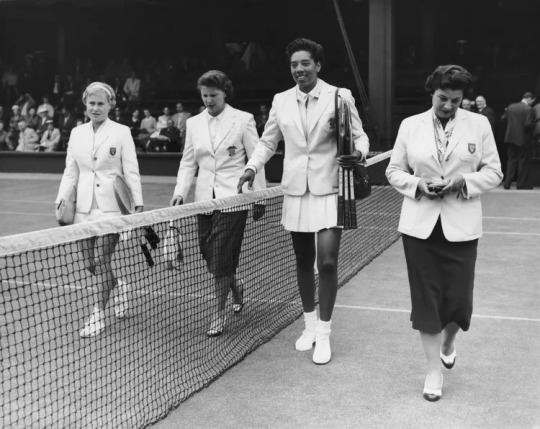
Reg Speller / Getty Images
Althea Gibson started playing tennis as a child in New York City, winning her first tennis tournament at age 15. She dominated the American Tennis Association circuit, reserved for Black players, for more than a decade. In 1950, Gibson broke the tennis color barrier at Forest Hills Country Club (site of the U.S. Open); the following year, she became the first African American to play at Wimbledon in Great Britain. Gibson continued to excel at the sport, winning both amateur and professional titles through the early 1960s.
Dorothy Height (March 24, 1912–April 20, 2010)
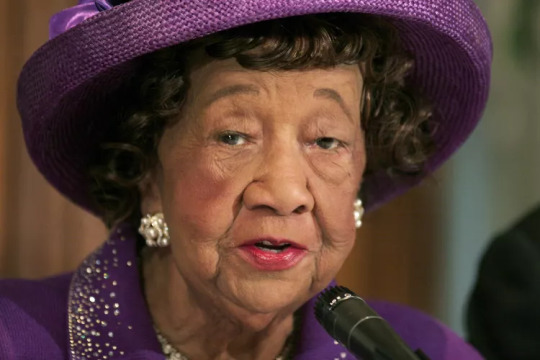
Chip Somodevilla / Getty Images
Dorothy Height has been described as the godmother of the women's movement because of her work for gender equality. For four decades, she led the National Council of Negro Women (NCNW )and was a leading figure in the 1963 March on Washington. Height began her career as an educator in New York City, where her work caught the attention of Eleanor Roosevelt. Beginning in 1957, she led the NCNW and also advised the Young Women's Christian Association (YWCA). She received the Presidential Medal of Freedom in 1994.
Rosa Parks (Feb. 4, 1913–Oct. 24, 2005)
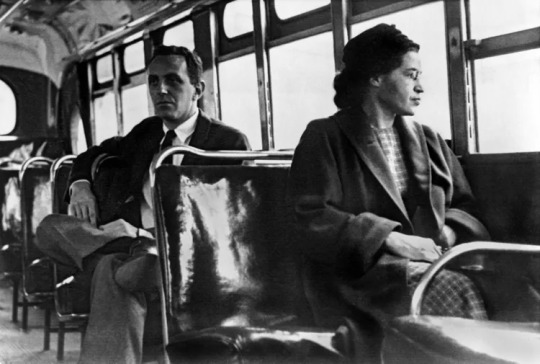
Underwood Archives / Getty Images
Rosa Parks became active in the Alabama civil rights movement after marrying activist Raymond Parks in 1932. She joined the Montgomery, Alabama, chapter of the National Association for the Advancement of Colored People (NAACP) in 1943 and was involved in much of the planning that went into the famous bus boycott that began the following decade. Parks is best known for her December 1, 1955, arrest for refusing to give up her bus seat to a White rider. That incident sparked the 381-day Montgomery Bus Boycott, which eventually desegregated that city's public transit. Parks and her family moved to Detroit in 1957, and she remained active in civil rights until her death.
Augusta Savage (Feb. 29, 1892–March 26, 1962)
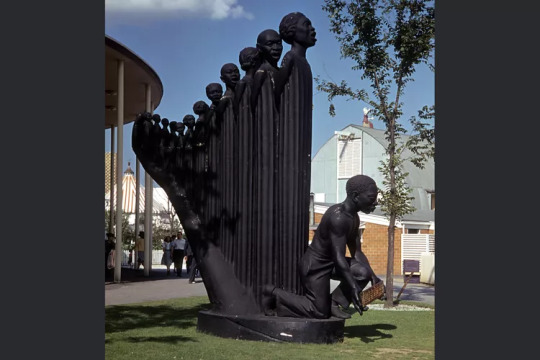
Archive Photos / Sherman Oaks Antique Mall / Getty Images
Augusta Savage displayed an artistic aptitude from her youngest days. Encouraged to develop her talent, she enrolled in New York City's Cooper Union to study art. She earned her first commission, a sculpture of civil rights leader W.E.B. Du Bois, from the New York library system in 1921, and several other commissions followed. Despite meager resources, she continued working through the Great Depression, making sculptures of several notable Black people, including Frederick Douglass and W. C. Handy. Her best-known work, "The Harp," was featured at the 1939 World's Fair in New York, but it was destroyed after the fair ended.
Harriet Tubman (1822–March 20, 1913)

Library of Congress
Enslaved from birth in Maryland, Harriet Tubman escaped to freedom in 1849. The year after she arrived in Philadelphia, Tubman returned to Maryland to free her family members. Over the next 12 years, she returned nearly 20 times, helping more than 300 enslaved Black people escape bondage by ushering them along the Underground Railroad. The "railroad" was the nickname for a secret route that enslaved Black people used to flee the South for anti-slavery states in the North and to Canada. During the Civil War, Tubman worked as a nurse, a scout, and a spy for Union forces. After the war, she worked to establish schools for formerly enslaved people in South Carolina. In her later years, Tubman also became involved in women's rights causes.
Phillis Wheatley (May 8, 1753–Dec. 5, 1784)

Culture Club/Hulton Archive/Getty Images
Born in Africa, Phillis Wheatley came to the U.S. at age 8, when she was captured and sold into enslavement. John Wheatley, the Boston man who enslaved her, was impressed by Phillis' intellect and interest in learning, and he and his wife taught her to read and write. The Wheatleys allowed Phillis time to pursue her studies, which led her to develop an interest in poetry writing. A poem she published in 1767 earned her much acclaim. Six years later, her first volume of poems was published in London, and she became known in both the U.S. and the United Kingdom. The Revolutionary War disrupted Wheatley's writing, however, and she was not widely published after it ended.
Charlotte Ray (Jan. 13, 1850–Jan. 4, 1911)
Charlotte Ray has the distinction of being the first African American woman lawyer in the United States and the first woman admitted to the bar in the District of Columbia. Her father, active in New York City's Black community, made sure his young daughter was well educated; she received her law degree from Howard University in 1872 and was admitted to the Washington, D.C., bar shortly afterward. Both her race and gender proved to be obstacles in her professional career, and she eventually became a teacher in New York City instead.
#10 of the Most Important Black Women in U.S. History#Black Women#Black Women Matter#Black Lives Matter#us history
216 notes
·
View notes
Text
The children who remember their past lives
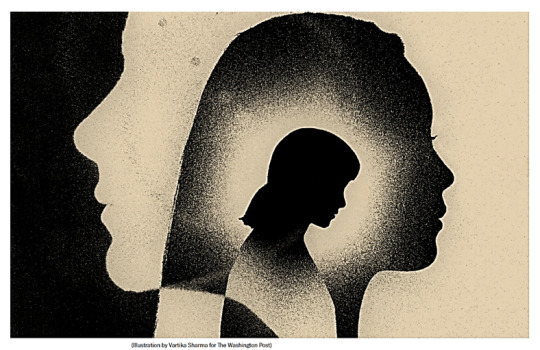
I've known for some time about the qualitative research done regarding young children who seem to recall past lives. Of course such research cannot provide the empirical evidence that double-blind controlled studies can provide, but it nonetheless raises some provocative questions. This is a gift🎁link, so you can read all of the article, even if you don't subscribe to The Washington Post. Below are some excerpts from the article:
Two-year-old Aija had invented plenty of fictional characters before, but her parents — Ross, a musician, and Marie, a psychologist — noticed right away that Nina was different.... From the time Aija learned how to talk, she talked about Nina, and her descriptions were remarkably consistent. Aija told her parents that Nina played piano, and she loved dancing, and she favored the color pink (Aija emphatically did not). When Aija spoke as Nina, in the first person, Aija’s demeanor changed: Her voice was sweeter and higher-pitched, her affect more gentle and polite than what Marie and Ross typically expected from their rambunctious toddler.
[...]
It all seemed more curious than concerning — until one afternoon in the early spring of 2021, when Marie came to believe that there was something more to Nina. That day, Marie recalls, she and Aija were playing together in their living room, enacting little scenes with toy figurines.
Then Aija suddenly turned to her mother and said, “Nina has numbers on her arm, and they make her sad.”
Marie’s mind raced. “What did you say?” she asked her daughter, willing her voice to remain calm.
“Nina has numbers on her arm, and they make her sad,” Aija said again, pointing to the inside of her forearm. Then she added: “Nina misses her family. Nina was taken away from her family.”
[...]
Marie knows how this story might sound, and she is exceedingly careful about sharing it.
Marie also knows that she is not alone — that since the 1960s,more than 2,200 children from across the world have described apparent recollections from a previous life, all documented in a database maintained by the Division of Perceptual Studies within the Department of Psychiatry and Neurobehavioral Sciences at the University of Virginia School of Medicine. Sometimes a child presents enough identifying information for relatives or researchers to pinpoint a deceased person, but that level of specificity is elusive; about a third of the cases in the database do not include such a match.
[...]
Certain consistent patterns have emerged: The most pronounced and convincing cases, Stevenson and Tucker both found, tend to occur in children between the ages of 2 and 6. They might suddenly describe places they have never been, people they have never met, sometimes using words or phrases that seem beyond their vocabulary. Nightmares or sleep disturbances are occasionally reported. Many of these children are highly verbal, and start speaking earlier than their peers. Their descriptions of past-life recollections often fade away entirely by the time the child turns 7 or 8.
#past lives#reincarnation#children who remember past lives#division of perceptual studies#uva school of medicine#jim tucker#ian stevenson#caitlin gibson#the washington post#gift link
23 notes
·
View notes
Text
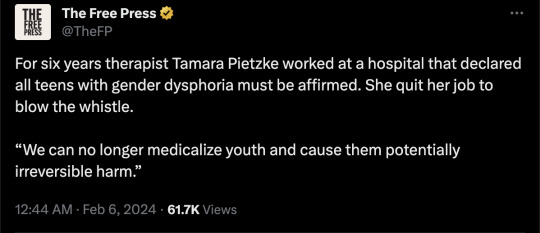

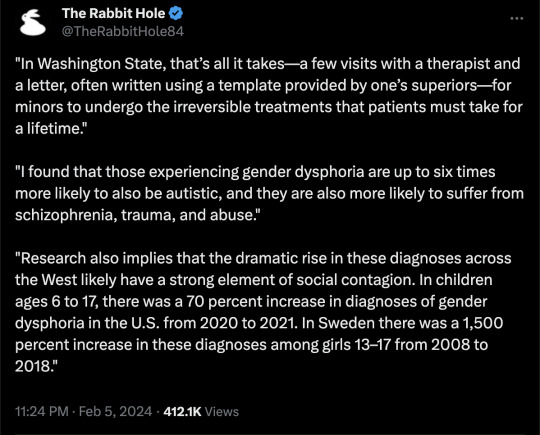
By: Tamara Pietzke
Published: Feb 5, 2024
For six years I worked at a hospital that said all teenagers with gender dysphoria must be affirmed. I quit my job to blow the whistle.
I know from firsthand experience what hard times are. Though I had a happy childhood, raised as the middle child by working-class parents in Washington State, my mom died of ovarian cancer when I was 22.
After that, my family fell apart. I felt lost and alone.
I decided to become a therapist because I didn’t want anyone to go through what I had, feeling like no one on this planet cares about them. At least they can say their therapist does.
I earned my master’s in social work from the University of Washington in 2012, and I have worked as a therapist for over a decade in the Puget Sound area. Most recently, I was employed by MultiCare, one of the largest hospital systems in the state.
For the six years I was there, I worked with hundreds of clients. But in mid-January, I left my job because of what I will go on to describe.
The therapeutic relationship is a special one. We are the original “safe space,” where people are able to explore their darker feelings and painful experiences. The job of the therapist is to guide a patient to self-understanding and sound mental health. This is a process that requires careful assessment and time, not snap judgments and confirmation of a patient’s worldview.
But in the past year I noticed a concerning new trend in my field. I was getting the message from my supervisors that when a young person I was seeing expressed discomfort with their gender—the diagnostic term is gender dysphoria—I should throw out all my training. No matter the patient’s history or other mental health conditions that could be complicating the situation, I was simply to affirm that the patient was transgender, and even approve the start of a medical transition.
I believe this rise of “affirmative care” for young people with gender dysphoria challenges the very fundamentals of what therapy is supposed to provide.
I am a 36-year-old single mother of three young kids all under the age of six. I am terrified of speaking out, but that fear pales in comparison to my strong belief that we can no longer medicalize youth and cause them potentially irreversible harm. The three patients I describe below explain why I am taking the risk of coming forward.
* * *
Last spring, I started seeing a new client, who at 13 years old had one of the most extreme and heartbreaking life stories I’ve ever heard. (For the sake of clarity, I am referring to all patients by their biological sex.)
My patient’s mother has bipolar disorder and was so abusive to my patient that the mother was given a restraining order. My patient was sexually assaulted by an older cousin, by one of her mother’s boyfriends, and also once at school by a classmate. Her diagnoses include depression, PTSD, anxiety, intermittent explosive disorder, and autism. She is being raised by her mother’s ex-boyfriend (not the one who assaulted her).
The year before I started seeing her, when she was 11, she was hospitalized for talking about committing suicide. Later that year, a pediatrician diagnosed her with gender dysphoria after she started to question her gender. The pediatrician referred her to Mary Bridge Children’s Gender Health Clinic, whose clinicians recommended she take medicine to suppress her periods and that she think about starting testosterone.
Mary Bridge, MultiCare’s pediatric hospital, runs the gender clinic for minors and employs nurses, social workers, dietitians, and endocrinologists, who provide gender-affirming care, which includes prescribing hormones to young patients who question their gender. In order to get that prescription, patients first need a recommendation letter from a therapist. Because Mary Bridge is a part of MultiCare, their patients were often referred to therapists like me who were in their system.
In an April 2022 blog post, a Mary Bridge social worker wrote that the gender clinic’s referrals increased from less than five a month in 2019 to more than 35 a month in 2022. In May 2022, the clinic received a $100,000 donation from Patient-Centered Outcomes Research Institute “to study health care disparities” in transgender youth.
The clinic operates in Washington, one of the states with some of the most lenient legislation on gender transition for youth. In May 2023, the state legislature passed a law guaranteeing that youth seeking a medical gender transition can stay at Washington shelters—and the shelters are not required to notify their parents.
Because of my patient’s autism, it was difficult for us to engage in introspective conversations. During our first visit, she came over to my desk to show me extremely sadistic and graphic pornographic videos on her phone. She stood next to me, hunched over, hyper-fixated on the videos as she rocked back and forth. She told me during one session that she watched horror and porn movies growing up because they were the only ones available in her house.
She showed up to our therapy sessions in disheveled, loose-fitting clothes, her hair greasy, her eyes staring down at the ground, her face covered by a Covid mask almost like a protective layer. She went by a boy’s name, but she never raised gender dysphoria with me directly—though one time she told me she would get mad at the sound of her own voice because “it sounds too girly.” When I asked her how she felt about an upcoming appointment at the gender clinic, she told me she didn’t know she had one.
In between scrolling through videos on her phone, she told me how she cried every night in bed and felt “insane.” She described a time when she was eight years old and her mother nearly killed her sister. She remembered her mother being taken away. At times, she would “age-regress,” she told me, by watching Teletubbies and sucking on pacifiers.
When she started seeing me, she had recently threatened to “blow up the school,” which resulted in her expulsion.
I knew I couldn’t solve all of her problems, or make her feel better in just a few therapy sessions. My initial goal was to make her feel comfortable opening up to me, to make the therapy room a place where she was heard and felt safe. I also wanted to try to protect her from falling prey to outside influences from social media, her peers, or even the adults in her life.
With a patient like this, with so many intersecting and overwhelming problems, and with such a tragic history of abuse, it took our first three sessions to get her feeling more comfortable to even talk to me, and to understand the dimensions of her problems. But when I called her guardian last fall to schedule a fourth appointment, he asked me to write her a letter of recommendation for cross-sex hormone treatment. That is, at age 13, she was to start taking testosterone. Such a letter from me begins the process of medical transition for a patient.
In Washington State, that’s all it takes—a few visits with a therapist and a letter, often written using a template provided by one’s superiors—for minors to undergo the irreversible treatments that patients must take for a lifetime.
I was scared for this patient. She had so many overlapping problems that needed addressing it seemed like malpractice to abruptly begin her on a medical gender transition that could quickly produce permanent changes.
The MultiCare recommendation letter Tamara was given for approving the medical treatment of minors with gender dysphoria. I emailed a program manager in my department at MultiCare and outlined my concerns. She wrote back that my client’s trauma history has no bearing on whether or not she should receive hormone treatment.
“There is not valid, evidenced-based, peer-reviewed research that would indicate that gender dysphoria arises from anything other than gender (including trauma, autism, other mental health conditions, etc.),” she wrote.
She also warned that “there is the potential in causing harm to a client’s mental health when restricting access to gender-affirming care” and suggested I “examine [my] personal beliefs and biases about trans kids.”
When Tamara outlined her concerns about giving a patient testosterone to her manager at MultiCare, she was told to “examine your personal beliefs and biases about trans kids.” She then reported me to MultiCare’s risk management team, who removed my client from my care and placed her with a new therapist.
A risk manager’s job is to minimize the hospital’s liability, but in my case, they deemed that my concerns posed a greater risk to my client than giving her a life-altering procedure with no proven long-term benefit.
I shouldn’t have been surprised by this. Just a few months earlier, in September of last year, I was one of over 100 therapists and behavioral specialists at the MultiCare hospital system required to attend mandatory training on “gender-affirming care.”
As hard as it is to believe given my work, I hadn’t heard about gender-affirming care before that moment. I needed to know more. So each night in the week leading up to the training, I searched online for information about gender-affirming care. After putting my kids to bed, I sat glued to my computer screen, losing sleep, horrified at what I found.
I discovered that neither puberty blockers nor cross-sex hormones (testosterone or estrogen) were approved by the Food and Drug Administration as a treatment for gender dysphoria. In fact, prescribing these treatments to kids can have drastic side effects, including infertility, loss of sexual function, increased risk of heart attack, stroke, cardiovascular disease, cancer, bone density problems, blood clots, liver toxicity, cataracts, brain swelling, and even death.
While gender clinicians claim hormonal treatment improved their patients’ psychological health, the studies on this are few and highly disputed.
I found that those experiencing gender dysphoria are up to six times more likely to also be autistic, and they are also more likely to suffer from schizophrenia, trauma, and abuse.
The research also implies that the dramatic rise in these diagnoses across the West likely have a strong element of social contagion. In children ages 6 to 17, there was a 70 percent increase in diagnoses of gender dysphoria in the U.S. from 2020 to 2021. In Sweden there was a 1,500 percent increase in these diagnoses among girls 13–17 from 2008 to 2018.
Yet, countries that were once the pioneers of gender transition medicine are now starting to backtrack. In 2022, England announced it will close its only gender clinic after an investigation uncovered subpar medical care, including findings that some patients were rushed toward gender transitions. Sweden and Finland undertook comprehensive analyses of the state of gender medicine and recommended restrictions on transition of minors.
I decided—though it was potentially dangerous to my career and to me—to ask questions about the findings I discovered.
The training I attended laid out an affirming model of gender care—from pronouns and “social transition” to hormone treatments and surgical intervention. In order for children to be diagnosed with gender dysphoria, the training stated, patients must meet six of eight characteristics, ranging from “a strong desire/insistence of being another gender” to “strong preference for cross-gender toys and games.”
Tamara and her MultiCare colleagues were trained to diagnose gender dysphoria among their young patients when they met six of the eight above characteristics. It was made abundantly clear to all in attendance that these recommendations were “best practice” at MultiCare, and that the hospital would not tolerate anything less.
When the leader of the training brought up hormone treatments, I shakily tapped the unmute button on Zoom and asked why 70 to 80 percent of female adolescents diagnosed with gender dysphoria have prior mental health diagnoses.
She flashed a look of disgust as she warned me against spreading “misinformation on trans kids.” Soon the chat box started blowing up with comments directed at me. One colleague stated it was not “appropriate to bring politics into this” and another wrote that I was “demonstrating a hostility toward trans folks which is [a] direct violation of the Hippocratic Oath,” and recommended I “seek additional support and information so as not to harm trans clients.”
In the training, gender-affirming treatment is presented as “suicide prevention.” As soon as I closed my laptop, I burst into tears. I care so deeply about my clients that even thinking about this now makes me cry. I couldn’t understand how my colleagues, who are supposed to be my teammates, could be so quick to villainize me. I also wondered if maybe my colleagues were right, and if I had gone insane.
Later, my boss reached out to me and told me it was “inappropriate” of me to raise these questions, telling me that a training session was not the proper forum. When I tried to present the evidence that caused me concern—the lack of long-term studies, the devastating side effects—she told me she didn’t have time to read it.
“I am speaking out because nothing will change unless people like me blow the whistle,” Tamara writes. “I am desperate to help my patients.” In retrospect, this ideology had been growing in power for a long time.
I remember in 2019 seeing signs of how gender dysphoria arose among many of my most vulnerable female clients, all of whom struggled with previous psychological problems.
In 2019, I started seeing a 16-year-old client after her pediatrician referred her to me for anxiety, depression, and ADHD. When I first met her, she had long blonde hair covering her eyes, to the point you could barely see her face. It was like she was going through the world trying to be invisible.
In 2020, during the pandemic, she told me she had started reading online a lot about gender, and said she started feeling like she wasn’t a girl anymore.
Around this time, her anxiety became so debilitating she couldn’t leave her house—not even to go to school. After taking a year off school during the pandemic, she enrolled in an alternative school for kids struggling with mental health. I was relieved that she was making friends for the first time, and seemed to be feeling a lot better.
Then she started using they/he pronouns, identified as pansexual, and replaced the skirts and fishnet stockings she often wore with disheveled and baggy clothes. Her long hair became shorter and shorter. She started wearing a binder to flatten her breasts. She tried out a few different names before settling on one that’s gender neutral.
The official diagnosis I gave her was “adjustment disorder”—an umbrella term often applied to young people who are having a hard time coping with difficult and stressful circumstances. It’s the type of diagnosis that doesn’t follow a child forever—it implies that mental distress among kids is often transient.
She came out as transgender to her family in 2021. Her mother was supportive, but her dad wasn’t. Regardless, she went to her pediatrician seeking a referral to a gender clinic.
In 2022, she went to Mary Bridge Children’s Gender Health Clinic for the first time, where the clinicians informed her and her parents that if she didn’t receive hormone replacement therapy, she could be “at increased risk for anxiety, depression, and worsening of mental health/psychological trauma,” according to her patient records. Her dad refused to start his daughter on testosterone, and so all the clinic could do was prescribe birth control to stop her period due to her “menstrual dysphoria,” or distress over getting her period. Which is something I thought all teenage girls experienced.
Five months later, she swallowed a bottle of pills and her mother had to rush her to the emergency room.
By early 2023, my client logged on to our weekly session, which we started doing by Zoom, and she told me she identified as a “wounded male dog.” She explained to me that this was her “xenogender,” a concept she had discovered online, which references gender identities that go “beyond the human understanding of gender.” She said she felt she didn’t have all of the right appendages, and that she wanted to start wearing ears and a tail to truly feel like herself.
I was stunned. All I could do was silently nod along.
After the session, I emailed my colleagues looking for advice. “I want to be accepting and inclusive and all of that,” I wrote, but “I guess I just don’t understand at what point, if ever, a person’s gender identity is indicative of a bigger issue.”
I asked them: “Is there ever a time where acceptance of a person’s identity isn’t freely given?”
The consensus from my colleagues was that it wasn’t a big deal.
“It sounds like this isn’t something that’s ‘broken,’ ” one colleague wrote me back, “so let’s not try to ‘fix’ it.”
“If someone told me they use a litterbox instead of a toilet and they were happy with it and it’s part of their life that brings them fulfillment, then great!” she continued. “I might think it’s weird, but then again, not my life.”
After learning that one of Tamara’s patients identified as “a wounded male dog,” a colleague replied: “If someone told me they use a litterbox instead of a toilet and they were happy with it and it’s part of their life that brings them fulfillment, then great!” I was baffled and alarmed by her unquestioning affirmation. At what point does a change in identity represent a mental health concern, and not something to be celebrated and affirmed? Fortunately, my client never brought up her “xenogender” again. She also isn’t on testosterone due to her father’s disapproval. So I kept these thoughts to myself, and ultimately, in order to keep my job, I let it go.
Another female patient, who transitioned as a teen, serves as a warning of what happens when we passively accept the idea that gender transition will entirely resolve a patient’s mental health issues.
This client, who I started seeing in 2022, is now 23 and rarely leaves the house, spends most of the day in bed playing video games, and envisions no path to working or functioning in the outside world due to a variety of mental health problems. In 2016, this patient was diagnosed with autism, anxiety, and gender dysphoria. Later the diagnoses grew to include depression, Tourette syndrome, and a conversion disorder. In 2018, at age 17, the Mary Bridge Gender Health Clinic prescribed testosterone, despite the fact that this patient is diabetic and one of the hormone’s side effects is that it might increase insulin resistance. The patient’s mother, who has another transgender child, strongly encouraged it.
This patient now has a wispy mustache and a deepened voice, but does not pass as male. It turns out that testosterone, which will be prescribed for life, did not relieve the patient’s other mental illnesses.
My biggest fear about the gender-affirming practices my industry has blindly adopted is that they are causing irreversible damage to our clients. Especially as they are vulnerable people who come to us at their lowest moments in life, and who entrust us with their health and safety. And yet, instead of treating them as we would patients with any other mental health condition, we have been instructed—and even bullied—to abandon our professional judgment and training in favor of unquestioning affirmation.
I am speaking out because nothing will change unless people like me—who know the risks of medicalizing troubled young people—blow the whistle. I am desperate to help my patients.
And I believe, if I don’t speak out, I will have betrayed them.
--

https://www.tandfonline.com/doi/pdf/10.1080/26895269.2022.2100644
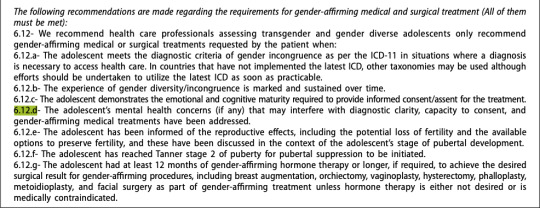
--

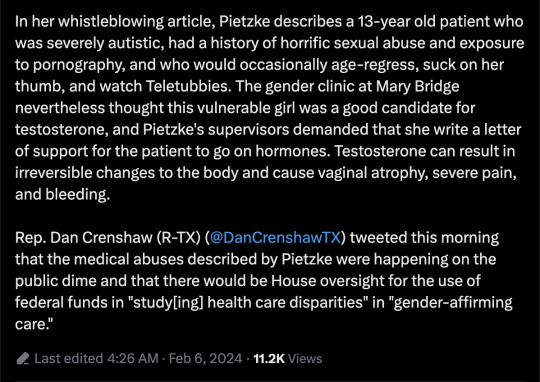
Amidst the scandal, Mary Bridge Children's has deleted the above blog post by self-professed "they/them," Aytch Denaro. However, the internet doesn't forget.
#Tamara Pietzke#Jamie Reed#whistleblower#medical malpractice#medical transition#medical corruption#gender dysphoria#gender ideology#queer theory#gender affirming care#gender affirming healthcare#gender affirmation#mental health#mental health issues#mental illness#gender cult#genderwang#religion is a mental illness
37 notes
·
View notes
Text
emergency contact | jack hodgins
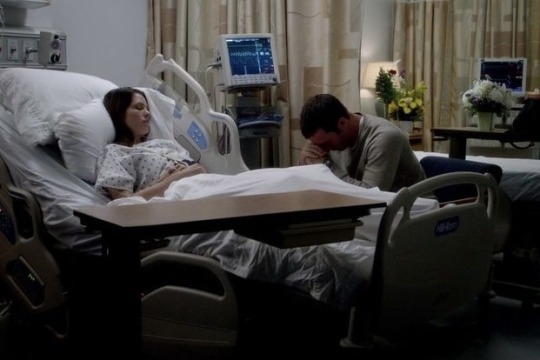
pairing — jack hodgins x fem!booth!reader
summary — hodgins hasn’t heard from you in over six months, after you broke up with him and disappeared. until he gets an alarming phone call in the middle of the night
warnings — angst, canon-typical violence, mentions of death
word count — 2,528
notes — a few things: i wrote this back in january, and it was rushed and poorly done but im being self-indulgent for this one | also im not tagging anyone bc i wanna see how far this will get on its own (except for my beloved @shmaptainwrites who indulged me ily mimi)
masterlist | navigation

2:47am
Despite his many years working for the Jeffersonian, Hodgins had yet to get used to his phone ringing at odd hours. With a groan and a stretch, his palm landed where his phone lay on the nightstand table. Without checking the caller ID, he picked up the phone and slurred out a tired greeting to the caller on the other line.
“Hello, Dr. Hodgins, I’m Marie, calling from the George Washington University Hospital.” Why was a hospital calling him so late at night? “You’re listed as the emergency contact for Y/n Booth, correct?”
Your name sent a shock through Jack’s body. “I— I guess so, yeah. Why? Is she okay?”
“Your fiancée was shot on duty, sir. She’s in surgery right now. We suggest you be with her when she wakes up.”
Without a second thought, Jack hung up the phone and flung out of bed. He didn’t care how things ended between the two of you, good or bad, but he knew one thing for certain: he needed to make sure you were okay. After scrambling for a decent set of clothing and his car keys, Jack rushed out of the house and down the near-empty streets to the hospital you were taken to.
Even though his mind was running at a mile a minute, Jack managed to recall what the nurse had told him. Shot on duty. You took a sabbatical seven months ago, were you back in town? Surely Booth must’ve known, he was your brother and co-worker, he had to have. Did he spare telling Jack to avoid the inevitable turmoil? Obviously you’d been back long enough to take a case, so it wasn’t like you had decided to come back out of the blue.
By the time he found parking, it was half past 3 in the morning, and Jack’s heart refused to stop beating out of his chest, his palms sweating rivers as he clenched and unclenched them. Despite all of this, though, he approached the front desk with a cracking resolve, trying his best to be put together for the sake of not distressing the night staff and lingering patient family members.
“Could you tell me where Y/n Booth is?”
The nurse behind the counter glanced up at him. “Connection to the patient?”
“I’m her-” he stumbled on the words. “Her, uh, fiancé. Emergency contact.”
She typed a few things into the computer when a voice from behind caught Jack’s attention.
“Hodgins.” Booth called, approaching with a weary face and a cup of likely burnt coffee.
Jack nearly sprinted over to the man, blue eyes frantically searching for answers in his features. “What’s up, man? I mean, what the hell happened?”
Booth took Hodgins by the arm and led him down a hallway, over to the elevators. “We were going after a perp. I told her not to go in first, that I’d handle the hard part. She didn’t listen, the bastard got her from behind, shot out one of her kidneys. Been in surgery for almost,” he checked his watch, “three hours now.”
Jack deflated just as the elevator doors dinged open. The pair stepped inside, the space empty apart from themselves. “I just— I don’t get it. Yesterday, she was somewhere even I didn’t know, taking some damn sabbatical. Yesterday, I was still pissed at her. Now? She’s in surgery because she was on a case. Because some asshole shot her. I mean, what the hell am I supposed to do with that, Booth?”
Unable to provide any kind of emotional support or response, Booth remained quiet as his friend tried his best not to break down in the elevator.
When the doors opened, Jack attempted to regain his composure as best as he could while Booth led him down the hall. There was a separate waiting room here, for family members who had someone in surgery. He sat opposite Booth, next to a sleeping little girl and her obviously exhausted mother.
He had no bearing of the passage of time, and felt as though there was no energy left within him to check the watch on his wrist. All he did was sit with his hands on his knees, head tilted to the sky, one leg bouncing like an infinite rubber ball. At some point, a doctor came out to notify the mother of her husband’s successful surgery — his tumor was gone, he’d told her, and there was little chance of it coming back.
It wasn’t until the sun started to peek in through the waiting room windows that a surgeon called out your name. Booth had been asleep in the chair across from Jack, but he was wide awake. The pair jumped up and approached the doctor, throwing questions at him rapidly.
“Y/n is okay. Surgery went well, though we’ll have to keep her here for longer than expected.”
“Why? What happened?” Booth asked.
The doctor sighed. “Due to the location of the entry wound, the bullet caused too much damage to her right kidney. For now, she’ll only be functioning with one until we can find a donor match. She’ll be on dialysis weekly and some medication to assist the working kidney, but otherwise, she’ll be just fine in a week or so. The bullet did puncture the liver and small intestine, but the speed of the bullet slowed enough to only cause minor damage, nothing we couldn’t fix up.” He told them, and a wave of relief crashed over the pair. “She’s being brought up to her room now, if you’d like to go wait with her.”
Jack only nodded, Booth trailing him as the doctor led them up one more floor, where you were being transferred to the ICU. It was painful, seeing you after so long, only for you to be hooked up to so many machines, laying nearly helpless in a bed. He pulled a chair up to your right side, reaching for your limp hand to hold, hoping you could feel him.
Hoping you knew he was there. That you knew he always would be.
Booth leaned against the door frame, watching everything with anguish. After you left for California, you kept in constant contact with your older brother. But even in those months, you never explained why you broke off the engagement so suddenly. Why you took a surprise sabbatical, why you went to California specifically. Why you became so closed off, so cold to everyone, even to Parker.
After a while, Booth left Jack alone to go pick up Parker from his mother’s house. He promised to be back later, your nephew in tow, and pressed a featherlight kiss to your forehead before he left.
Jack, swimming in an ocean’s worth of thought, barely noticed the sun coming over the horizon in the window opposite him. All he could do was process the emotions flowing through him. Anger, that you left him so suddenly and without explanation. Despair, that you’d come back so long ago and didn’t come to see him, to work things out. Worry, that despite your life-saving surgery, you wouldn’t get a new kidney, or that you’d never be the same again. Anger again, but at the bastard who shot you. Triumph, that he was rotting in a cell right now.
Jack’s only comfort in the sterile, whitewashed room was the steady beeping emanating from the heart monitor, a small assurance that you were okay. His hand remained clasped over yours for hours, thumb stroking the smooth skin on the back of your hand. Partly as a comfort to himself that you were still there, but mostly, he believed, a comfort to you. He hoped you could feel it; that you could feel his presence. He hoped his presence comforted you.
By the time you woke up, all the worry had faded from Jack’s body and exhaustion had taken its place. He was asleep, head supported by his arm on the side of the chair, when he heard the sheets rustle in the bed.
Somehow, in all your years of work, this was the first time you ended up in the hospital due to a job-related injury. It wasn’t the first time you woke up dazed after a surgery with little memory of how you got there, though.
The sheets, despite being thin, weighed down your legs and torso, providing warmth and comfort. You could feel the leads for the heart monitor stuck to your chest, irritating your skin in the slightest bit. There was a cannula feeding oxygen into your system, though it rubbed the skin on the back of your ears uncomfortably. The main thing, though, was that your torso hurt.
Despite that, you managed to notice something weighing down your right hand. It was warm, warmer than the blankets. And heavier. Garnering the courage to open your eyes, you blinked to adjust to the sunlight and fluorescent lights, trying to shift yourself upward, wincing when it pulled on your wound. Instead, you glanced over at your hand, only to find another on top of it. Following the arm connected to it, your heart stuttered and cracked when you found a sleeping Hodgins sitting next to your bed. Emotion swelled within your chest and tear ducts just at the sight of him, sleeping so peacefully next to you, his hand over yours in a firm grasp, as if that was the only thing that assured him that you were really here.
Slowly, quietly, you tried to pull your hand out from under Jack’s, only for the movement to wake him up. He stretched with a deep inhale, blinking rapidly as he took in his surroundings. It wasn’t until he noticed you were awake that he seemed to come to his senses.
“Hey,” he nearly whispered. “How’re you feeling?”
You bit back a scoff. “Terrible. First job back and of course I had to get myself shot.”
Jack fought a smile, scooting forward to raise the bed up for you to sit properly. “They said they got all the fragments of the bullet during surgery. You’re down a kidney for now, though.”
You only nodded, allowing yourself some time to gather your thoughts. “Why are you here, Hodgins?”
“Apparently, I’m still your emergency contact.” He told you, sitting back down and resting his elbows on his knees. “And apparently, I still care about you enough to show up.”
“Don’t put that on me.” You whispered, chest restricting as tears fought their way back to your waterline. “You can’t say that to me. Not after what I did to you. You should hate me. I mean, really hate me. Like, praying for my downfall, kind of hate. You shouldn’t still care about me.”
“Well, apparently I do. I thought I hated you, for a long time. But I guess I don’t.” Jack sighed, taking your hand. You wanted to protest, to pull away, but you let him. “I guess this was a wakeup call for me. Literally. They called me at 3 in the morning to tell me you were in surgery.”
You laughed, a wet sound underlined with sadness. “I’m sorry, Jack. Really, I am. I just…”
“What, don’t love me? It’s okay. I’ve learned to live with it.”
Even when he should hate you, Jack still understood, and even worse, he still loved you. He was, somehow, the world’s most understanding man. God, you love him.
“No, no I don’t hate you. Actually, it’s the opposite. I just wish things could’ve gone differently.”
Now Jack was just confused. “What d’you mean? You broke up with me for a reason, right? You told me you didn’t love me anymore.”
“It’s too complicated, Jack. I want to explain it all to you, really, but it’s not safe. I don’t know if or when it will be, and I won’t blame you if you want to find someone else, or if you already have. You deserve to be happy, Jack. You should move on from me.”
“I don’t want anyone else.” Jack said, emphasizing each word and squeezing your hand. “I just want you. From the moment I met you, I knew you were it for me, Y/n. Even with your brother breathing down my neck to not even think about pursuing our relationship. It was terrifying, but I ignored it. Because you were too important to have in my life. I couldn’t risk passing you up. I just don’t understand why you ended things so suddenly.”
The tears that you had been attempting to keep at bay for this entire conversation now flowed freely down your cheeks, the emotions you’d kept close to your chest for nearly a year now breaking free. Jack, like the gentleman he was, gently tilted your head toward him, reaching up and using the pads of his thumbs to brush them from your cheeks.
“I’m sorry,” you whimpered, daring to look him in the eye.
“Don’t be.” He whispered.
“I have to be. I hurt you. I ruined everything. And it wasn’t even worth it. It didn’t change anything.”
Despite his confusion, Jack said nothing. He simply stood to his full height and sat on the edge of the bed, pulling you into his chest — minding your wounds and stroking your hair. “It’s okay. You’re home now. We can fix this.”
“No we can’t.” You shook your head, looking up at him. “Jack, there’s nothing left to fix. Because if we fix it, you’ll die.”
After what felt like an eternity of swirling, spiraling thoughts, Jack found his voice. “What?”
“That’s why I left.” You said. “I was ordered to. I was working on a case, some underground organized crime syndicate. I found out some stuff I shouldn’t have. My hands were tied, I had no choice.” Choking back a sob, you wiped the tears from your face and took a breath. “It was either break up with you, call off the wedding, and leave, or everyone I loved would die. They were gonna kill you, kill Seeley and Parker, and drain your accounts. There was nothing I could do.”
Jack pulled you in tighter, his whole worldview shifting and turning on an axis. He couldn’t speak — hell, he could barely even think right now. Jack had spent months grieving your relationship, questioning why you broke things off, harboring a ruthless anger at what his life had become, and all of it faded to dust in an instant.
“I don’t know what to do,” you whispered, pulling Jack back to the present. “I work with these people, Jack. They could ruin me in an instant.”
“We’ll fix this, I promise.” Jack declared, and despite the fear that had overridden your senses for the past few months, you couldn’t help but believe him.
You only nodded, curling further into him as best as you could with your incisions. Fidgeting with the strings of his hoodie, you listened to the beat of his heart beneath you and took a deep breath.
Soon enough, you were drifting off to sleep with the firm belief that soon enough, with the help of your family, somehow, everything would be okay.

if you want more jack fics, please feel free to comment and let me know!! writing for smaller characters is always a gamble but if people read this i’d be more than happy to do so!
#jack hodgins#jack hodgins x reader#jack hodgins x y/n#jack hodgins x you#jack hodgins angst#bones fanfiction
26 notes
·
View notes